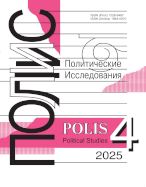Concept Misformation in Comparative Politics (II)
DOI: 10.17976/jpps/2003.04.14
Sartori G. Concept Misformation in Comparative Politics (II). – Polis. Political Studies. 2003. No. 4. https://doi.org/10.17976/jpps/2003.04.14
In the part of the article, published in this issue (for the beginning of the article see: Polis, 2003, №3), a model styled “a ladder of abstraction” is suggested and substantiated. Pointing out that there is no hard and fast dividing line between levels of abstraction and that the number of slices into which the ladder is divided largely depends on how fine one’s analysis needs to be, the author distinguishes three main levels of abstraction: high, medium and low. High level categorizations obtain universal conceptualizations: whatever connotation is sacrificed to the requirement of global denotation — either in space, time, or even in both. Descending a step, medium level categorizations fall short of universality and thus can be said to obtain general classes: at this level not all differentiae are sacrificed to extensional requirements. Finally, low level categorizations obtain specific, indeed configurative conceptualizations: here denotation is sacrificed to accuracy of connotation. In other words, while moving along the ladder of abstraction, we either make a concept more abstract and more general by lessening its properties or attributes, or specify it by the addition (or unfolding) of qualifications, i.e. by augmenting its attributes or properties.
 Full Text (электронная версия)
Full Text (электронная версия)See also:
Weber M.,
Russia's Transition to Pseudoconstitutionalism. – Polis. Political Studies. 2006. No2
Brinkman von A.,
Unauthoritative Laws (To the Psychology of Russian Executive Power) (Foreword by I.L. Belenky). – Polis. Political Studies. 2006. No1
Massing O.,
Domination. – Polis. Political Studies. 1991. No6
Aron R.,
An Essay on Liberties: A Universal and Unique Formula of Liberty Does Not Exist. – Polis. Political Studies. 1996. No1
Bruder W.,
Bureaucracy. – Polis. Political Studies. 1991. No5





.jpg)






 print
print.jpg)
.jpg)